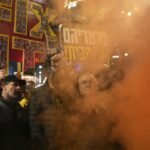The deployment is part of the Trump administration’s move to declare a ‘national emergency’ on the US southern border.
The US military has begun deploying 1,500 active-duty troops to the country’s southern border with Mexico, as part of President Donald Trump’s long-running crackdown on immigration.
The White House confirmed the troop movement on Wednesday, although full details of the order have not yet been released.
Officials told US media that 500 Marines were among the service members involved. They are not expected to perform law enforcement duties as part of their role at the border.
The troop deployment was widely expected, as immigration was a hallmark of Trump’s campaign for a second term.
Shortly after being sworn in on Monday, the Republican leader made a signing. Executive order Declaring a “national emergency” on the border, he repeated some of the heated statements he made during the campaign.
“America’s sovereignty is under attack,” the executive order said. “This attack has caused widespread chaos and suffering in our country over the past 4 years.”
The order includes provisions for the deployment of armed forces “to support the activities of the Secretary of Homeland Security in achieving full operational control of the southern border.”
It emphasized the use of unmanned aerial surveillance along with the construction of additional physical barriers.
Trump’s communications team hailed Wednesday’s troop deployment as a fulfillment of his campaign season promise.
White House press secretary Carolyn Levitt said it was something President Trump campaigned on.
“The American people have been waiting for a time like this — for our Department of Defense to really take homeland security seriously.”
An estimated 2,500 US National Guard members and reserve troops are already at the border.
In addition, U.S. Customs and Border Protection employs more than 45,000 people. As FY 202319,104 of these employees served as Border Patrol agents to secure areas between official ports of entry.
However, immigration advocates worry that an increased military presence at the border could discourage legitimate asylum claims or lead to the use of military tactics against civilians.
But Trump has argued that a military response is needed given the rate of illegal entry into the United States.
He has regularly linked immigration to rising crime, which is not reflected in the statistics. Studies have repeatedly shown that undocumented people in the U.S. commit crimes at much lower rates than U.S.-born citizens, including violent crimes.
Still, Trump used examples like 22-year-old nursing student Lacan Riley to push his proposals.
In February 2024, Riley was murdered while jogging at the University of Georgia, and an undocumented Venezuelan man was ultimately convicted of her murder.
On Wednesday, the House of Representatives passed the But Raleigh Act, which is named in his honor.
It requires Immigration and Customs Enforcement (ICE) to arrest or detain any undocumented person for a crime such as theft or robbery. Having already passed the Senate, the bill now heads to Trump’s desk, where he is expected to sign it. It will be the first major piece of legislation of his administration.
But human rights advocates have warned that the bill could violate due process for defendants, because those subject to the law should only be convicted of the crime, not the crime.












































